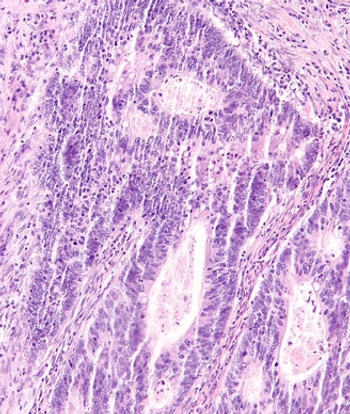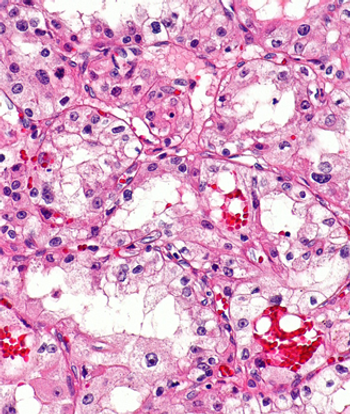
Colorectal Cancer
Latest News
Latest Videos

CME Content
More News

Investigators will assess botensilimab and balstilimab for non-microsatellite instability-high/mismatch repair deficient metastatic colorectal cancer in a randomized phase 2 trial.

Progression-free survival and overall survival appear to be worse in patients with metastatic colorectal cancer who have a high- vs low-BRAF allele fraction after treatment with a BRAF inhibitor plus an anti-EGFR agent plus or minus a MEK inhibitor.

The new drug application that was submitted to the FDA for fruquintinib in refractory, metastatic colorectal cancer is supported by data from the phase 3 FRESCO-2 trial.

The panel shares some closing thoughts on ctDNA testing in patients with colorectal cancer.

The panel comments on how they see ctDNA assay usage evolving in colorectal cancer management.

Stacey A. Cohen, MD, and Aparna Parikh, MD, MS, review the design and outcomes of key clinical trials exploring the use of ctDNA assays in colorectal cancer.

The panel reviews the different settings in colorectal cancer where ctDNA is being investigated as a tool for treatment and monitoring.

Dr Daniel H. Ahn explains the logistical concerns of ctDNA testing in colorectal cancer.

Aparna Parikh, MD, MS, defines circulating tumor DNA (ctDNA) and the use of ctDNA assays in colorectal cancer.

The panel discusses other emerging biomarkers for monitoring patient response to therapy for colorectal cancer.

Dr Aparna Parikh explains minimal residual disease (MRD) in colorectal cancer and the logistical challenges of MRD testing.

Dr Stacey A. Cohen discusses how she typically monitors patients with stage II and III colorectal cancer during and after adjuvant therapy.

Stacey A. Cohen, MD, and Daniel H. Ahn, DO, describe the challenges of deciding which patients with colorectal cancer should receive adjuvant therapy, and the risk of over- and under-treatment in later stages.

Although trilaciclib appears to reduce neutropenia following treatment with FOLFOXIRI and bevacizumab in patients with metastatic colorectal cancer, the phase 3 PRESERVE 1 trial will be stopped due to a lack of responses.

Aparna Parikh, MD, MS, details when she would recommend adjuvant chemotherapy to patients with similar presentations of colorectal cancer.

Tanios S. Bekaii-Saab, MD, presents a patient scenario of a 64-year-old man with stage 2 (pT3N0) colon cancer to the panel for discussion.

Expert oncologists review key updates regarding metastatic colorectal cancer from recent meetings and discuss their implications on real-world clinical practice.

The use of circulating tumor DNA in patients with advanced colorectal cancer may provide early insight into who is and is not responding to treatment, according to an expert from Weill Cornell Medicine.

Findings from the phase 3 BREAKWATER study indicate that encorafenib plus cetuximab and chemotherapy produces activity and is well-tolerated in metastatic colorectal cancer harboring BRAF V600E mutations.

Findings from the phase 2 MOUNTAINEER trial indicate that HER2 scoring algorithms may help in identifying which patients are suitable to receive tucatinib plus trastuzumab for metastatic colorectal cancer.

Findings from the phase 3 SUNLIGHT study highlight favorable overall survival and disease control rates with the use of bevacizumab plus trifluridine and tipiracil in metastatic colorectal cancer.

Novel, personalized, tumor-informed brPROPHET technology can assess molecular residual disease with greater sensitivity than other assays, according to initial data.

Molecular responders by G360 response algorithm with advanced colorectal cancer appear to have significantly lengthened time on treatment and overall survival with all regimens vs patients who did not respond.

An expert from the Mayo Clinic discusses how findings from the ongoing phase 3 MOUNTAINEER trial may enable access to tucatinib, trastuzumab, and chemotherapy in earlier lines of treatment for patients with HER2-positive metastatic colorectal cancer.

An expert from the Duke University School of Medicine describes how the FDA approval of tucatinib plus trastuzumab in HER2-positive metastatic colorectal cancer will improve access to treatment.






































